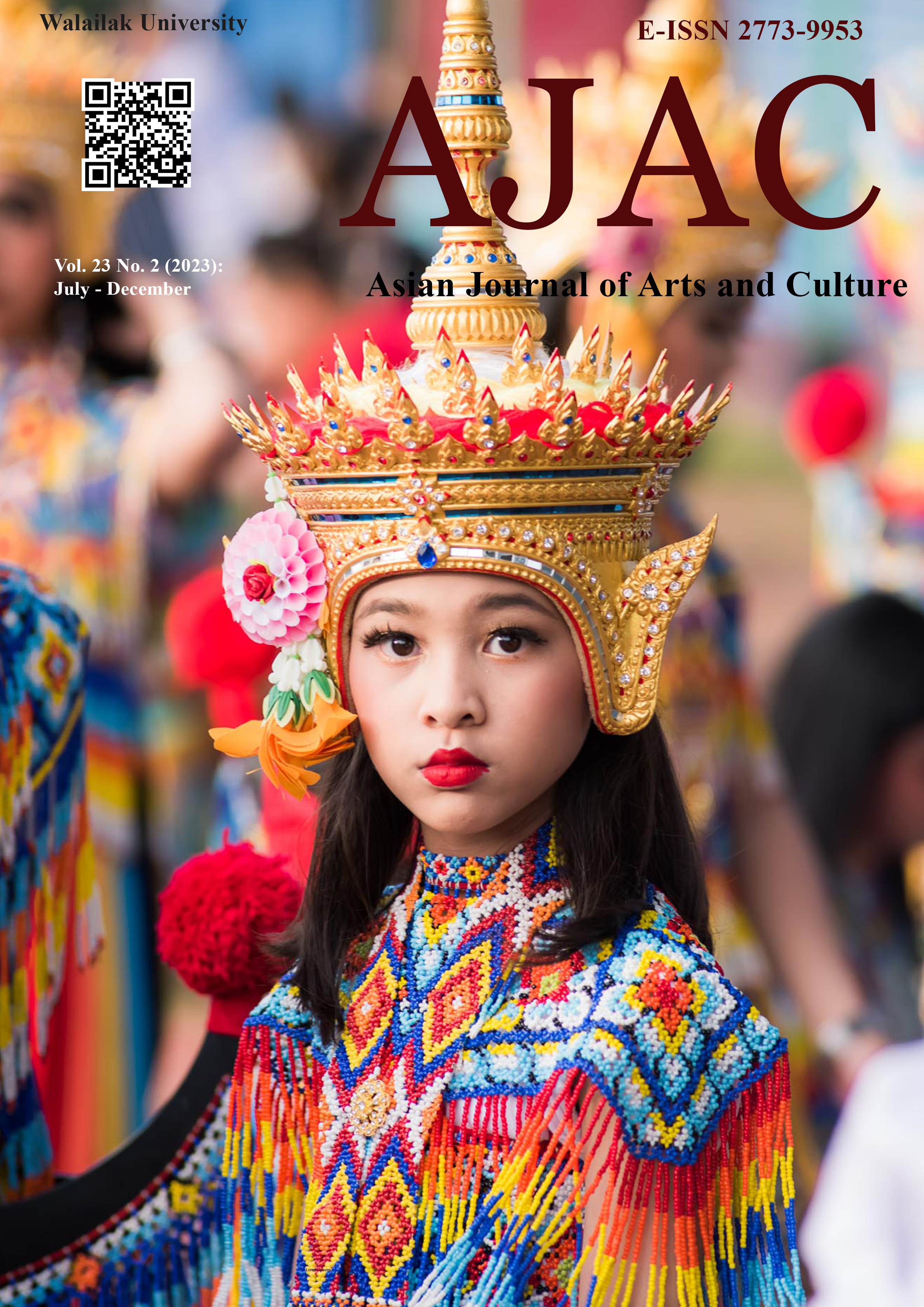Concept of Development of Curriculum for Dramatic Arts Teachers for Local Development in The 21st Century
Main Article Content
Abstract
This article aims to study the concept of the development of curriculum for dramatic arts teachers for local development in the 21st century. This content is part of the research on the development of model of curriculum for dramatic arts teachers for local development. The researcher studied the concept and theory of curriculum development. Teaching concepts in the 21st century, concepts of creating teacher identity, concepts of dramatic arts, role of dramatic arts in society and concepts of local development. The concept of curriculum development was studied by using systematic reviews to analyze and synthesize the data. The results of the research revealed that curricula are a collection of subjects and activities that serve as guidelines for educational management that focus on developing learners to achieve educational objectives. The components of the curriculum are aims, content, implementation and evaluation. The concept of teaching in the 21st century emphasizes the characteristics of teachers who are skilled in using technology and creating students to be thinkers and developers. It is the heart of promoting learning, integration with the community and professional development in the 21st century to keep up with the changes in today's era. The concept of creating a teacher identity for self-understanding and acceptance, recognizes their roles and duties according to the society around them. The graduates are required to learn the fundamentals of dramatic arts, both theory and practice, because the dance plays a role in society in many dimensions, especially the idea of bringing integrated dance to develop to meet the needs of local people. Therefore, the aforementioned concept is a guideline for developing a curriculum model as a model and a guideline for administrators, faculty members and educational personnel to apply the information on the components of the curriculum model to be applied in designing and developing curricula to produce dancing teacher graduates in accordance with the needs of the local development each context of different regions in the country further.
Article Details

This work is licensed under a Creative Commons Attribution-NonCommercial-NoDerivatives 4.0 International License.
© 2018 by Asian Journal of Arts and Culture, Walailak University. All rights reserved.
References
Brown, S. (2004). Assessing learners in higher education. London, England: Kogan.
Chaikanmueang, A. (2004). People's Participation in Sub-community Development within Municipality: A Case Study of Laem Chabang Sub-district Municipality. Chonburi Province, Thailand: Burapha University.
Chatsuriyawong, S. (2014). The paradigm of community based learning management to promote competence. Critical thinking and creative problem solving for elementary school students. (Ph.D. Dissertation, Silpakorn University, Thailand).
Chickering, A. & Reisser ,W. (1993). Education and identity. Hoboken, USA: SanFracisco: Jossey-Bass.
Education Council Secretariat Ministry of Education. (2017). National Qualifications Framework; NQF, revised. Bangkok, Thiland: Prikwan Graphic Co., Ltd.
Erikson, B. H. (1968). Identity Youth and Crisis. Now York, USA: Norton & Company.
Fuangfusakul, A. (2003). Identity. Bangkok, Thailand: National Research Council of Thailand.
Good, C. V. (1973). Dictionary of Education. New York, USA: McGraw-Hill.
Kulrattanarak, L. (2014). Development of a model curriculum in Educational Education Sciences according to the framework of teacher competency in Southeast Asia in the 21st century. (Ph.D. Dissertation, Chulalongkorn University, Thailand).
Methanee, S. (2016). Curriculum development and teaching in the field of Western Dramatic Arts at the graduate level in Thailand by comparative science method. (Ph.D. Dissertation, Chulalongkorn University, Thailand).
Office of the Administration of Upper Secondary Education Office of Basic Education. (2015). Guidelines for learning management in the 21st century focusing on professional competence. Retrieved from http://www. secondary11. go.th/ 2016/ th/download/ files/guidance10 . pdf.
Office of the Basic Education Commission, Ministry of Education, Sor. (2010). Guidelines for curriculum management according to the basic education core curriculum, 2008. Retrieved from https://sgs.bopp-obec.info/menu/Data/CD_Book1.pdf.
Office of the National Economic and Social Development Council and Office of the Prime Minister (2022). (Draft) National Economic and Social Development Plan, No. 13, 2023-2027. Retrieved from http://nscr.nesdc.go.th.
Office of the Permanent Secretary, Ministry of Education Ministry of Education Education Development (2017). Plan of the Ministry of Education Vol. 12 Retrieved from https://waa.inter.nstda.or.th/stks/pub/2017/20170313-Education-Development-Plan-12.pdf
Office of the Secretariat of the Education Council, Ministry of Education. (2017). Revised National Qualifications Framework. Bangkok, Thailand: NESDB.
Panich, V. (2014). Innovation towards an education country. Retrieved from https://www.gotoknow. org/ posts/ 565909.
Petchuay, S. (2015). The future of teacher production in Thai higher education institutions. (Ph.D. Dissertation, Chulalongkorn University, Thailand).
Prachayaprut, A. (2018). Developing a teacher production model to support education in the 4.0 era. Faculty of Education, Chulalongkorn University. Retrieved from https://cuir.car.chula.ac.th/ dspace /bitstream /123456789/58704/1/ Apipa%20Pr_Res_2561.pdf.
Rice, F. P. (1996). The Adolescent : Develpment Relationship and Culture. Boston, USA: Allyn and Bacon.
Ritthikupt, W. (2018). Community-Based Learning Management : Effective Learning ManagementStrategies of Teachers in the 21st Century. Graduate School Journal Volume 11 Number 3 September - December 2018.
Royal Academy. (2003). Royal Institute Dictionary 1999. Bangkok, Thailand: Nanmee Publications. Royal Gazette. (2013). Regulations of the Teachers Council of Thailand on Professional Ethics 2013. Retrieved from https://www.ksp.or.th/ksp2018/.
Saylor, J. G. a. A. W. M. (1974). Planning Curriculum for Schools. New York, USA: Holt Rinehart and Winston.
Sri-iam, S. (2011). Student identity development in higher education institutions. (Ph.D. Dissertation, Chulalongkorn University, Thailand).
Sukmat, A. (2010). Curriculum Development to Enhance Desirable Characteristics of Prathomsuksa 4 Students Based on the Concept of Intellectual Education. (Ph.D. Dissertation, Srinakharinwirot University, Thailand).
Taba, H. (1962). Curriculum Development: Theory and Practice. New York, USA: Harcort, Bace and World Inc.
Tyler, R. W. (1950). Basic Principle of Curriculum and Instruction Chicago: Chincago, USA. University of Chincago Press.
Utranan, S. (1995). Curriculum and teaching. Bangkok, Thailand: Chulalongkorn University.
Wirunrak, S. (2004). Principles of performing classical dance. Bangkok, Thailand: Chulalongkorn University press.
Wongwichian, P. (2015). The future of the characteristics of teaching graduates. Branch of Thai Dramatic Arts in the Next Decade (2017 – 2026). Retrieved from http://www. Downloads/ 40235-Article% 20Text-92002- 1-10-20151001% 20(2).pdf.
Wongyai, W. (2011). Curriculum development in higher education. 2nd edition Bangkok, Thailand: R & Print Co., Ltd.


